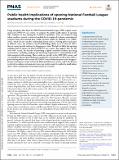Public health implications of opening National Football League stadiums during the COVID-19 pandemic
Author(s)
García Bulle, Bernardo; Shen, Dennis; Shah, Devavrat; Hosoi, Anette E
DownloadPublished version (1.810Mb)
Publisher with Creative Commons License
Publisher with Creative Commons License
Creative Commons Attribution
Terms of use
Metadata
Show full item recordAbstract
<jats:title>Significance</jats:title>
<jats:p>Using data from 2020, we measure the public health impact of allowing fans into sports stadiums during the COVID-19 pandemic; these results may inform future policy decisions regarding large outdoor gatherings during public health crises. Second, we demonstrate the utility of robust synthetic control in this context. Synthetic control and other statistical approaches may be used to exploit the underlying low-dimensional structure of the COVID-19 data and serve as useful instruments in analyzing the impact of mitigation strategies adopted by different communities. As with all statistical methods, reliable outcomes depend on proper implementation strategies and well-established robustness tests; in the absence of these safeguards, these statistical methods are likely to produce specious or misleading conclusions.</jats:p>
Date issued
2022-04-05Department
Massachusetts Institute of Technology. Institute for Data, Systems, and Society; Massachusetts Institute of Technology. Department of Electrical Engineering and Computer Science; Massachusetts Institute of Technology. Department of Mechanical EngineeringJournal
Proceedings of the National Academy of Sciences
Publisher
Proceedings of the National Academy of Sciences
Citation
García Bulle, Bernardo, Shen, Dennis, Shah, Devavrat and Hosoi, Anette E. 2022. "Public health implications of opening National Football League stadiums during the COVID-19 pandemic." Proceedings of the National Academy of Sciences, 119 (14).
Version: Final published version